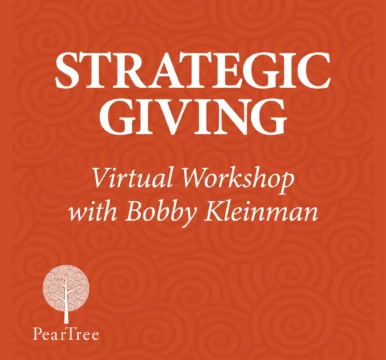This Forum contains the sole opinions & insights of the author based on forty years of providing advice to donors and charities. Others may totally disagree with the author’s views. This Forum is intended as a conversation. Robust debate is invited. Please respond with questions and alternative viewpoints to askbobby@peartreecanada.com
In the last Forum, we looked at gifts of appreciated securities. This is a tremendous planned gift (PG) which has had a transformational effect on philanthropy in Canada. This Forum will look at the donation by Canadian Controlled Private Corporations (“CCPCs”) aka holding companies (“HC”) of marketable securities. In some ways a gift by a HC of marketable securities – publicly traded shares – is more efficient than donating the same shares if held by an individual. Before we dive into the analysis of marketable security gifts from a company, I’d like to note that in the United States, the IRS also allows capital gains exemptions on gifts of marketable securities. In fact, the change in Canada’s tax law in 2006 enabling the donation of publicly listed securities without paying capital gains tax is patterned after US tax law. In the US, this applies to all long-term held capital property (not just marketable securities), allowing Americans to gift or transfer their property to charitable trusts. At first, one might think that Canadians would envy these rules that apply to our American neighbours, as they allow for exemptions on capital property gifts. However, since Canadian tax rates are higher the tax savings from an appreciated security gift is much higher than what Americans enjoy.
When the Federal government raised taxes on income over $200,000 in 2016 the appeal of donating appreciated publicly listed securities in Canada was highlighted. In most all provinces including Ontario and Quebec, the top tax rate is now over 53%, so a gift of fully appreciated securities (ACB nil) means the tax savings from the gift approaches 80%. The higher the tax, the more value to planned giving.
Corporate Gifts
First, let us understand why there are corporate gifts. Canada’s tax system allows and stimulates the accumulation of wealth in companies, which we will call holding companies. This is due to the ability for an operating company to pay tax at operating corporate tax rates (usually around 27%) and then declare dividends to the parent company, which is an HC – moving profits up into the HC on a tax-free basis. This allows the entrepreneur to move excess profits to the HC where diverse investments can be made. Thus, whilst the source of the HC wealth may initially be the subsidiary operating company, over time HCs often accumulate real estate, other assets, and marketable securities.
The corporation is where the money is, and relieving it of charitable dollars by leveraging marketable securities, mining flow-through financings and even insurance policies can solve estate tax situations via gift planning.
The wealth accumulated in these companies is taxed at death (usually the second death of a married couple) as at death the assets owned by the HC including marketable securities are deemed to be disposed of at fair market value. Since in many cases the shares have very low initial cost aka low basis (ACB) there can be pretty significant capital gains taxes then payable. The ‘deemed disposition on death’ provisions are in essence a Canadian estate tax. Assume a company owns 100 shares of a public company with a value of $1,000 and a cost base of $200. Gifting the security will yield a $1,000 tax receipt and assuming a 50% tax rate, a saving of $500. The $800 gain on the shares is not taxed. Normally half, (which in this case would be $400) is taxable and at a 50% rate, we save a further $200 so our savings are $700.
Furthermore, tax-free income of a company goes into the company’s capital dividend account (CDA) and can be distributed to the CCPC’s shareholders on a tax-free basis. There are three main additions to CDA. Corporate insurance proceeds upon death are received tax-free in the company. Most of the proceeds go into the CDA. Next capital gains, or more accurately, the 50% of capital gains not taxed (just like for individuals) add to the CDA (and 50% of capital losses reduce the CDA). But most importantly, a gift of marketable securities results in 100% of the gain not taxed (not just 50%) and added to the CDA.
Therefore, in our example, $800 is added to the CDA, where normally with a capital gain $400 would be added. There is an extra $400 of CDA which can be distributed to the HC shareholders tax-free.
Just to restate this important issue companies can declare dividends out of its CDA. CDA dividends are received tax-free to the shareholder. The gift yielded an extra CDA of $400. Assuming a 33.33% personal tax rate, the company would have to remit a normal dividend of $600 to yield the shareholder the same $400 after-tax. This saves the company $200. Now, let’s add the $200 to the previous calculated savings of $700, and the gift has saved the company a total of $900. The cost of gift is now an impressively low $100.
The CDA add is not always of value, if there is no intention to pay dividends or there is so much CDA around that adding CDA is not really effective.
This Planned Gift is tremendous!
Now, let us think long-term; remembering that there is capital gains tax on death. Assume Mr. A owns 100 common shares of “ACO”, with a cost base of $100. The company has $2M of marketable securities, cost $200,000. On the death of Mr. A, there would be $450,000 tax due on these shares (FMV on death of $2M less ACB of $ 200,000 = $ 1.8M capital gain resulting in about $ 450,000 in tax).
What happens if prior to Mr. A’s death, ACO donates $100,000 of shares to charity? ACO is now (simplistically) worth $1.9m. By making the $100,000 donation ACO has achieved three tax benefits (1) tax deduction saving ACO $ 50,000, (2) a reduction by $100,000 of the value of the shares reducing tax on death by $ 20,000 and (3) the donation of the $ 100,000 with a capital gain of $80,000 adds $ 80,000 to CDA payable as a tax-free dividend to Mr. A. As long as ACO has use of the receipts, a plan to gift marketable securities over time can be part of an effective estate plan satisfying charitable dreams while significantly reducing tax and preserving family assets.
Often, we see HCs where an estate freeze occurred years ago. For example, if the company is worth $10Mwith the children owning the common shares, and spouse owning $1.8m of low-cost base preferred, which would be taxable at death. If the company donated the $2m of securities ($200,000 cost) over time to use the receipts, and with every CDA addition redeems the spouse’s preferred shares using the CDA, the estate tax issue can be eliminated.
The corporation is where the money is, and relieving it of charitable dollars by leveraging marketable securities, mining flow-through financings and even insurance policies can solve estate tax situations via gift planning. As we progress in these Forums we will explore these plans.
We’d love to hear from you! Please direct any questions to askbobby@peartreecanada.com and the answers will appear in the next Forum.
Robert (Bobby) K leinman FCPA, FCA
leinman FCPA, FCA
Bobby started in philanthropy in August of 1994 by becoming the Executive Director of the Jewish Community Foundation of Montreal (JCF) which is seen to be Canada’s most donor-centred foundation.
Previously a Partner in Taxation at Ernst and Young, he is now a Planned Giving Consultant specializing in tax-assisted giving. Bobby has helped many Canadian charities design their planned giving programmes, and has written numerous articles on the subject. He is also Past-President of the Conseil de la Philanthropie du Quebec, the Table Ronde du Quebec of the CAGP, JIAS Canada, JIAS Montreal, and the Mount Royal Tennis Club.



